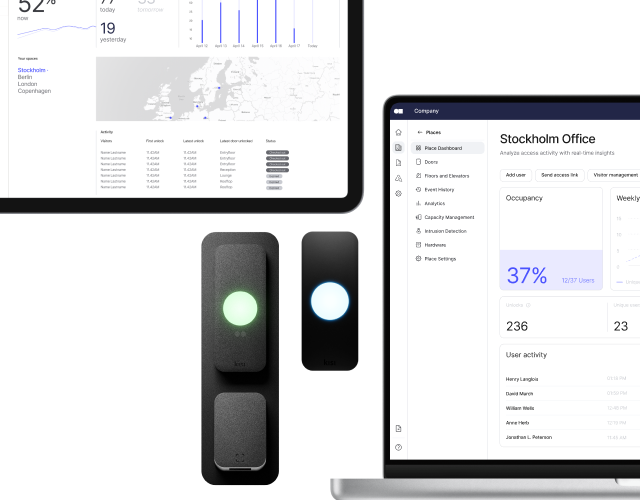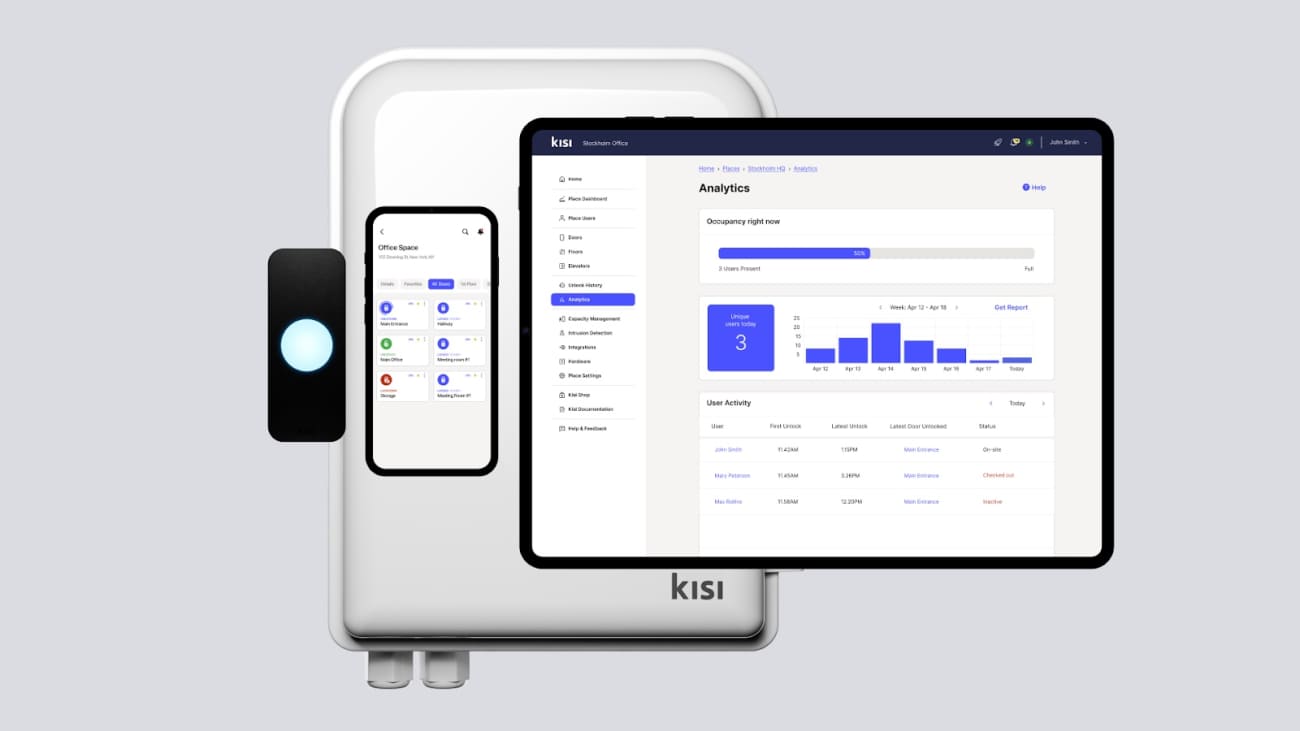When a customer trusts your business with their treasured or valuable belongings, the worst thing you can do is leave them unprotected. Failing to secure a self-storage facility is the equivalent of sending an open invitation to prospective thieves and vandals.
With self-storage security solutions, you can safeguard your customers’ items and strengthen your reputation. Cloud data storage and remote access management technology, in particular, enable storage facilities to expand their offerings and streamline their operations.
In this article, you’ll discover the level of security self-storage access control can provide. You’ll also learn the advantages of modern access control and what to look for in a system for your facility.

What is self-storage access control? #
Self-storage access control is a system of devices and software that limits who can enter a storage unit or facility. It enables you to shield your clients’ personal property from unauthorized access and criminal activity.
How self-storage access control works #
When a self-storage business uses an access control solution, only approved individuals with the proper credentials can enter. Many facilities have gates, while others rely on door locks on each storage unit. In either case, when a client approaches, they use their credentials—such as key cards, fobs, or mobile devices—to unlock the door.
When the system reads the client’s credentials, it sends a signal to a controller connected to the cloud or an on-premise server containing security information for everyone on your customer list. If it finds that the user is approved to enter that particular unit or space, it triggers a door unlock. If, on the other hand, the system finds that the user isn’t included in the database or that their authorization has been revoked due to lack of payment, it rejects their access request and the door remains closed.

Key components of self storage security solutions #
Although no two systems are identical, self-storage access control solutions usually consist of these parts:
- Electronic locks
- User credentials, such as key fobs, keycards, or mobile apps
- Access controller
- Access reader
- Access control software
Most modern systems rely on WiFi or Bluetooth connections to read user credentials and transmit information to the database. As such, you’ll need internet access and compatible devices to activate and use your access control.
Self-storage facilities also often install additional hardware for greater security, including surveillance cameras for 24/7 video monitoring and alarms for doors and gates. Some also use intercoms to communicate with visitors or clients who have forgotten their credentials and need to request access.

Why you should have self-storage access control security #
For many customers, security, safety, and convenience are top priorities when selecting a self-storage provider. Self-storage access control security systems are by far the most flexible and agile solutions to fully address those concerns. They leverage modern technology and innovation to give customers fast and easy access to their units.
Competitive edge #
The demand for self-storage hit record levels during the pandemic, but that explosive growth has slowed. While self storage ownership remains high and experts project the industry will continue to flourish, the market is increasingly competitive. To survive, self storage operators must set themselves apart with superior service and sophisticated features.
Having a system that is streamlined, easy to use, and hack-proof strengthens your clients’ confidence in your business and can, in turn, boost your business growth. Self-storage renters want a facility that is well secured to prevent theft and intrusions into their data and privacy. They also need a way to gain access to their units at any time of day or night. An access control system tailored to your needs allows for both.

Convenience and accessibility #
Access control systems make entering a storage unit easier for everyone. From the business’s perspective, it’s not necessary to have staff available 24/7 to assist customers with entering their units. For clients, there’s no need to keep up with a key or go back home to retrieve it when you realize you need to pick something up from your unit.
These systems also simplify the process when a customer wants to grant access to someone else. For example, imagine that a customer is in the hospital and needs a family member to retrieve an item or document from their storage unit. With a storage rental app and access control, self-storage tenants don’t have to be physically present to access their units. Instead, they can unlock doors remotely or request a temporary access link or QR code for someone without giving a physical key, a keycard, or sharing the keycode.
Durability #
Another advantage of self-storage access control is how long-lasting and reliable it is. Whereas locks and keys eventually wear down and stop working, a credential reader can withstand repeated use without getting damaged.
Many access control providers, including Kisi, have weather-resistant hardware. This means customers can enter their units regardless of whether it’s raining or snowing, and businesses will spend less money replacing or repairing door locks and user credentials.

Real-time activity #
Even though their belongings aren’t in their immediate possession, self-storage owners want to know what’s happening to their property. Self-storage access control allows your customers to monitor the activity in their units by tracking who goes in and out.
As a business owner or operator, you may also want to keep an eye on who enters the self storage facility. This data is beneficial if a customer ever questions whether an unauthorized person gained access or if law enforcement has questions following a security incident. Modern access systems, like Kisi, can also send real-time notifications whenever a potential incident takes place, enabling you to respond quickly if an unauthorized person tries to break into a storage unit.
Data collection #
High-quality access control offers a trove of information that you can use to enhance your self-storage offerings. Each time a tenant accesses their unit, the system records their entry. Other information you can collect includes how long individuals stay on the premises and how often they visit. These data points can help you make critical business decisions and evaluate whether you need to change your security processes and hours of operation to better meet your clients’ needs.
Types of access control systems for self-storage #
Most of today’s advanced access control systems include electronic or wireless locks—devices that keep doors closed with mechanical locks. You unlock them using electronic credentials rather than physical keys.
You can use these kinds of locks with a variety of access control solutions, including:
- Mobile devices: Mobile apps and proximity chips are shaping the future of self-storage access control. Customers can unlock their units with the devices they always carry with them, either by tapping the unlock button in a mobile app or holding their phone near the reader.
- Key cards and fobs: By assigning customers key fobs or cards, you can grant them instant access to their storage units. They simply have to hold their credential close to the reader to trigger the unlocking process.
- Keypads: With keypads, users enter a pre-set code to unlock the door. These systems often aren’t as secure or convenient because tenants forget their passcodes and they can be stolen and used by unauthorized individuals. Still, connecting them to a modern, cloud-based system like Kisi will enhance the security of your keypads with remote management, intrusion detection, and security integrations.
- Biometrics: Some access control systems for self-storage facilities use biometric readers. These devices are extremely secure because the owner has to complete a facial or fingerprint scan to unlock the door. Still, it can create challenges with privacy and scalability as well as remote access, for instance, if customers want friends or family members to access their belongings.
When selecting a self-storage security solution, consider what type of system will be most effective and will offer the easiest access for your customers.

How to choose the right self storage access control system #
Access control has become a must-have for self-storage businesses, and there are many providers and systems promising to meet your needs. If you’re struggling to find the best fit, start by looking at these factors.
Features of an effective system #
Budget is a major concern for self-storage facilities implementing access control, but it shouldn’t be the only point you consider. The investment you make in security will pay off long into the future, particularly if you use a system with robust features that optimize the security of your units, automating security and saving operational overhead costs.
Look for a solution that includes most or all of these capabilities:
- Remote management: A cloud-based system like Kisi is accessible from any location with an internet connection. This is critical for reducing operational costs and unmanning spaces. This way, clients and facility operators can monitor their units, grant access, and unlock doors from a distance.
- Integrations: To create an efficient security system, look for an access control system that can integrate with what you already have in place, including smart locks and security cameras. If a native integration isn’t possible, research whether they offer an open API.
- Scheduling: Some access control systems enable you to set schedules when clients can unlock doors. For example, you might opt to leave access open 24 hours a day, or you might restrict it to specific times, such as 6 am to 10 pm.
- Data analytics: Look for a solution that allows you to collect data related to customer entries and security incidents. For instance, Kisi grants access to data in real time through a dashboard and can run reports to identify patterns.
- Alerts: Access control solutions that notify you when an unusual or suspicious event occurs can minimize the risk of break-ins and theft. Kisi’s intrusion alerts and door held open alerts, for instance, let you know if someone is attempting to access an area they aren’t authorized to enter.
To give your clients the best possible experience while also protecting your interests, aim to install a system that fits your budget without sacrificing advanced security. Some systems, like Kisi, offer tailored deployment options so you can upgrade at your own pace.

The importance of integrations #
Integrations are an especially important consideration when purchasing a self-storage access control system. The ability to combine access control with your other systems, including customer relationship management and security, is crucial to creating the ideal self-storage option for your customers.
For instance, many self-storage businesses integrate access control systems with video surveillance. With this combination of technologies, they can monitor on-site activity from the moment tenants walk into the storage unit the time they depart. Cameras also encourage customer confidence and deter criminal activity.
However, if your video surveillance and access control systems can’t integrate, you’ll have to manage them using separate software and dashboards. Finding a solution that allows you to tie various systems together creates a more secure, efficient management process with fewer security vulnerabilities.
Kisi’s access control is compatible with a wide range of other security solutions. In addition, you can create a security system tailored to your self-storage facility by combining Kisi’s access control and video surveillance services.
Protect your self-storage units with Kisi #
The global self-storage market size was an estimated $56.81 billion in 2023. In such a thriving industry, even the smallest distinctions can draw clients from one business to another. Access control is a major selling point, not to mention a vital source of security.
At Kisi, our self-storage access control security system is future-proof and designed to prevent unauthorized entries and streamline operations. We’re dedicated to offering modern security solutions that serve both you and your clients. Reach out to schedule a free demo and learn more about how we can support your self-storage facility.





